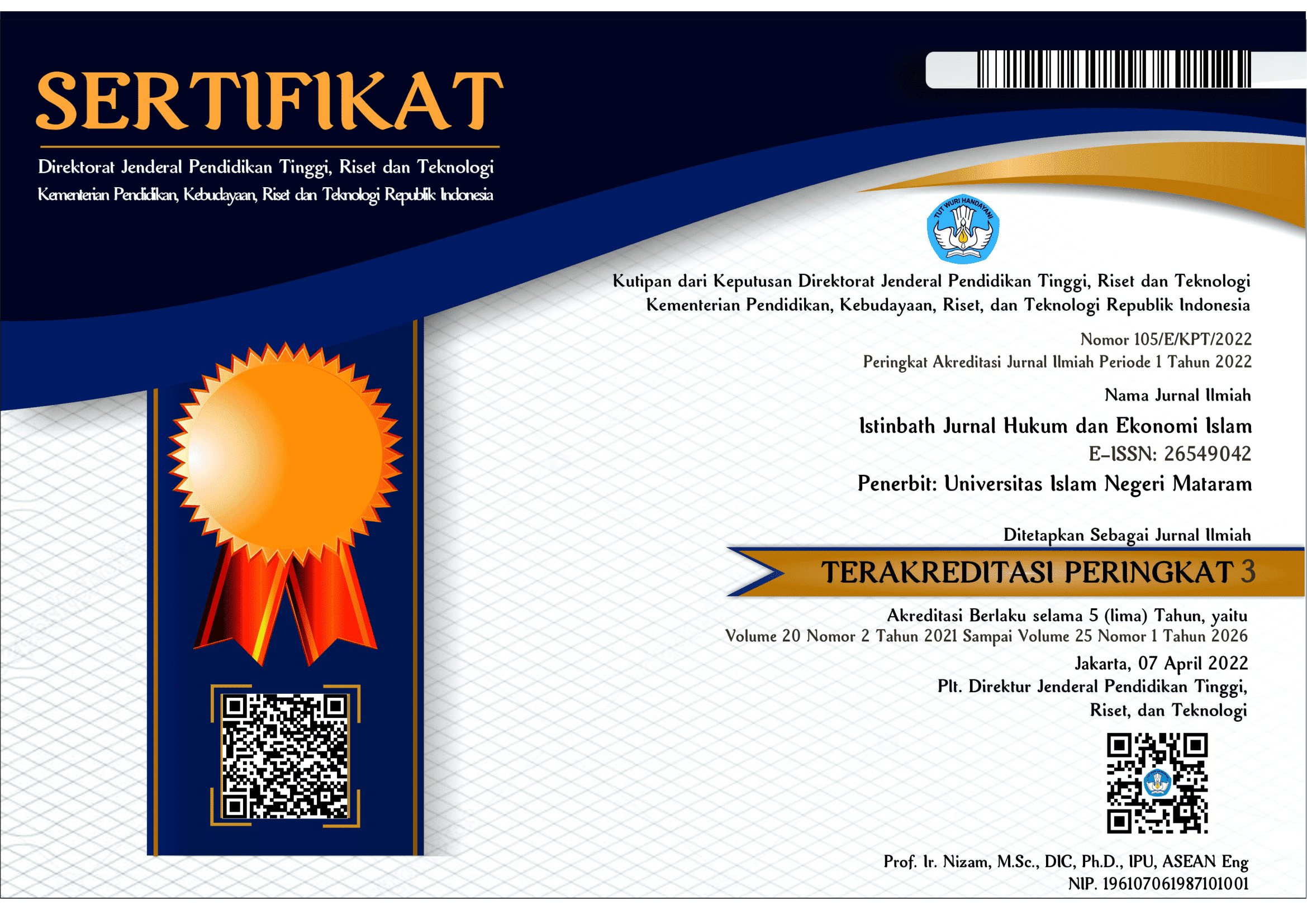COMMUNITY EMPOWERMENT ACCELERATION MODEL TO INCREASE THE ROLE OF MICRO WAQF BANK AULIA CENDEKIA IN SHARIA ECONOMIC DEVELOPMENT
DOI:
https://doi.org/10.20414/ijhi.v22i2.626Abstract
Micro Waqf Bank is an intermediary institution that has enormous potential to increase Islamic economic development through financing accompanied by business assistance. The purpose of this study is to analyze the implementation of Micro Waqf Banks in Aulia Cendekia and formulate a model for accelerating empowerment in improving economic development. This study used a descriptive qualitative approach, data were obtained from observation and interviews, and analytical techniques used triangulation. The results of this study found that the Micro Waqf Bank in Aulia Cendekia not only offers capital loans but seeks to empower people who become customers from the beginning to become potential customers until after becoming customers, namely facilities in the form of socialization, training, Compulsory Group Training, to weekly Group activities commonly called HALMI. The impact of implementation of the empowerment acceleration model of Micro Waqf Bank Aulia Cendikia has a positive impact on customers from a shared responsibility system, without collateral or interest resulting in usury, there are no other costs that reduce customer profits. In addition, Micro Waqf Banks are also carried out to empower the community under the supervision of OJK through accountability of internal reports to avoid actions outside the objectives and functions of Micro Waqf Banks as a means of empowering communities in micro businesses to achieve sharia economic development
References
Aisyah, S. (2019). Optimizing the Role of Micro Waqf Banks in Economic Empowerment of Business Actors Around Islamic Boarding Schools in East Java.
Al-Arif. (2011). Fundamentals of Islamic Economics. Solo: Solo: Era Dicitra Intermedia.
Avrizal, A., Haryadi, H., &; Hidayat, S. (2021). Analysis of micro, small, and medium enterprises (MSMEs) at pesentren huts in Jambi City. Journal of Economic Paradigms, 16(2), 391–408. https://doi.org/10.22437/jpe.v16i2.11821
Badina, T., &; Rosiana, R. (2022). The Role of Islamic Microfinance Institutions in Improving the Welfare of Micro Entrepreneurs. Scientific Journal of Islamic Economics, 8(1), 430. https://doi.org/10.29040/jiei.v8i1.3904
Bayumi, M. R. (2022). Reconstruction of Thayyiban Halal Business Concept Strengthening the Integration-Interconnection of the Halal Value Chain Ecosystem. Al-Mashrafiyah: Journal of Islamic Economics, Finance and Banking, 6(2), 64–80. https://doi.org/https://doi.org/10.24252/al-mashrafiyah.v6i2.28543
Bayumi, M. R., &; Jaya, R. A. (2018). BUILD INTEGRATION AND INTERCONNECTION IN THE ISLAMIC ECONOMIC SYSTEM TO CREATE ISLAMIC SOLUTIONS IN SOLVING SOCIAL PROBLEMS. Share: Journal of Islamic Economics and Finance, 7(1), 59–80. https://doi.org/10.22373/SHARE.V7I1.2293
Eloquent, F. (2018). Akad Qardh in Islamic Financial Institutions. Al-Amwal: Journal of Islamic Economic Law, 3(1), 23–33. https://doi.org/10.24256/alw.v3i1.197
Fahmi Irhamsyah. (2019). Sustainable Development Goals (SDGs) and Their Impact on National Resilience: Its Impact on National Resilience. Journal of Research LEMHANNAS RI, 38, 45–54.
Fathah, R. N., &; Safitri, T. A. (2020). Training on Simple Financial Reporting and Financial Management for MSMEs Registered with UNISA Micro Waqf Bank. Pangabdhi Scientific Journal, 6(2), 73–77. https://doi.org/10.21107/pangabdhi.v6i2.7538
Hardiati, N. (2021). Business Ethics of the Prophet SAW as a Successful Business Actor in the Perspective of Maqashid Sharia. Scientific Journal of Islamic Economics, 7(1), 513. https://doi.org/10.29040/jiei.v7i1.1862
Hidayanti. (2021). Implementation of Qardh Agreement on Financing Products at Micro Waqf Bank Khas Kempek, Gempol, Cirebon. UIN Maulana Malik Ibrahim Malang.
Hidayati, M. N. (2021). Analysis of Akad Qardhul Hasan's Practice in Sharia Economic Perspective at the At-Taqwa Mosque Prosperity Council Cooperative, Cicadas Sagalaherang Village, Subang Regency. EXISTBANK, 5(1), 151.
Humaira, &; Yunita. (2022). Application of Akad Qardhul Hasan on Al-Qardh Products as a Social Responsibility of Sharia Banking. OCEAN OF JUSTICE: Journal of Law, 254.
Medias, F. (2017). Waqf Bank: Indonesia's Socio-Economic Empowerment Solution. Indonesian Journal of Islamic Literature and Muslim Society, 2(1).
Nirmalasari, S. A., &; Putri, N. (2022). THE ROLE OF WOMEN IN IMPROVING HOUSEHOLD ECONOMICS PERSPECTIVE OF MAQASHID SYARIAHJASSER AUDA (CASE STUDY IN TENGARAN SUB-DISTRICT, SEMARANG REGENCY). Journal of Master of Sharia Economics, 1(1), 43–53.
Nurhayati, E., Rustamunadi, &; Fitriyyah, D. (2019). Analysis of Waqf Bank Financing Model in Empowering Sharia Micro Enterprises. Tazkiyya, 20(1), 91–114.
Nurhayati, S. and W. (2013). Sharia Accounting in Indonesia. Jakarta: Salemba Empat.
Priyono, S., Istiqomawati, R., &; Setyawan, I. (2022). Analysis of Qardhul Hasan's Financing in Improving the Welfare of Members Viewed from an Islamic Perspective. Equilibrium: Journal of Management Science, 2(2), 8–13.
Rozalinda, R., &; Nurhasnah, N. (2020). Micro Waqf Bank: Its Operations and Role in the Economic Empowerment of Muslim Communities in Islamic Boarding Schools. Islamic Reality: Journal of Islamic &; Social Studies, 6(1), 42. https://doi.org/10.30983/islam_realitas.v6i1.3119
Shodiqqy, M. A. (2019). Analysis of Qardh Financing Agreement in Sharia Microfinance Institutions of Yogyakarta Special Region. An-Nisbah: Journal of Sharia Economics, 6(2), 232–257. https://doi.org/10.21274/an.2019.6.2.232-257
Sudianto, S., &; Septiana, R. (2021). Implementation of Akad Qardhul Hasan at the Barokah Mandiri Prenduan's Alpine Micro Waqf Bank. Assyarikah: Journal of Islamic Economic Business, 1(2), 165–182.
Sulistiani, S. L., Yunus, M., &; Bayuni, E. M. (2019). The Role and Legality of Micro Waqf Banks in Pesantren-Based Poverty Alleviation in Indonesia. Bimas Islam Journal, 12(1), 1–26.
Syarofi, M. (2021). Implementation of Qardhul Hasan's Accounting in the Presentation of Financial Statements (Analysis of Qardhul Hasan's Financing in the Sharia Pattern Savings and Loans Unit in Banyuwangi). Al-Tsaman: Journal of Islamic Economics and Finance, 3(2), 59–71.
Ulpah, M. (2020). Concept in Islamic Banking Financing. Madani Shari'ah, 3(2), 147–160. Retrieved from file:///C:/Users/Acer/Downloads/208-Article Text-297-1-10-20200831.pdf
Ulum, F. (2015). Community economic empowerment by Islamic financial institutions: a case study in Bayt al-Mal wa Tamwil ar Ridho Trenggalek. Surabaya.
Yuliana, R., &; Akmal Tarigan, A. (2022). Analysis of MSME Empowerment Programs in Islamic Boarding Schools throughout North Sumatra to Improve Pesantren Development (Case Study of the Ministry of Religion of North Sumatra). EKOMA: Journal of Economics, 1(2), 242–250.
Yuliaty, T., Shafira, C.S., & Akbar, M.R. (2020). Strategi UMKM Dalam Menghadapi Persaingan Bisnis Global. Mbia, 19(3), 293–308. https://doi.org/10.33557/mbia.v19i3.1167.
Zayanie, JM, Fitria, A., &; Kamariah, R. (2019). Micro Waqf Bank and Creative Economy at Buntet Islamic Boarding School. Shirkah: Journal of Economics and Business, 4(2). https://doi.org/10.22515/shirkah.v4i2.269
Downloads
Published
How to Cite
Issue
Section
License
Copyright (c) 2023 Arif Rahman Nurul Amin

This work is licensed under a Creative Commons Attribution-ShareAlike 4.0 International License.





